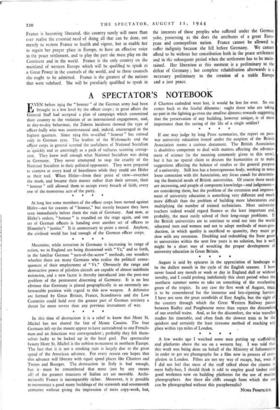If one may judge by long Press summaries, the report
on post- war university education issued under the auspices of the British Association seems a curious document. The British Association is doubtless competent to deal with matters affecting the advance- ment of science (in the meaning commonly given to this term), but it has no special claim to discuss the humanities or to make 'suggestions affecting the balance of studies or the general purpose of a university. Still less has a heterogeneous body, working in some loose connexion with the Association, any locus standi for determin- ing the financial needs of British universities. Of course these needs are increasing, and people of competent knowledge—and judgement— are considering them, but the problem of the extension and improve- ment of university education is something very different and much more difficult than the problem of building more laboratories and multiplying the number of trained technicians. Most university teachers indeed would regard finance as the least important and, probably, the most easily solved of their long-range problems. If the British universities are to continue to send out into the world educated men and women and not to adopt methods of mass-pro- duction, in which quality is sacrificed to quantity, they must go slow with any extension. Doubling and redoubling the State grant to universities within the next few years is no solution, but it well might be a short way of wrecking the proper development of university education in Great Britain.


























 Previous page
Previous page